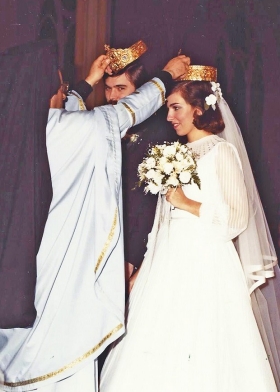In this age of ubiquitous dating websites and hook-up apps like Tinder and Grindr, Sawaya-Paiement has never been busier, with so many singles looking for love. Sawaya-Paiement sat down for a candid Q&A about finding love in the 21st century.
You began your career at the Montreal Stock Exchange where you became general manager and then chief administrative officer. How did you go from the MSE to president of Intermezzo Montréal?
Joan Sawaya-Paiement: “I had 20 wonderful years at the exchange, but I had two young kids and was working crazy hours. So I turned 40, decided it was time to retire and stay home with my kids.
But later on I needed more stimulation, so I went back to school at Concordia to do a degree in Italian. One of my electives was psychology and I loved that course so much, I ended up majoring in psychology instead.
When I finished, I wasn’t looking for a job, but a friend of mine was single. She asked me for help and when she found the Intermezzo website, she sent me the link and I discovered they were hiring. So I called the owner up, we met and he hired me on the spot, basically as a gofer.
But I learnt the business from the ground up and obtained my certifications as a matchmaker. Intermezzo’s been in business for 21 years, I began there in 2011, and I so believed in the product. I bought the business in 2013 and expanded our services.”
What’s the difference between a matchmaking service and dating website?
JSP: “Our business models are the complete opposite of one another. If you look at a matchmaker versus dating website, a dating website makes money if you don’t find anybody. They will not do anything to help you find a compatible partner because it is not lucrative for them. Whereas with a matchmaker, we work on a fixed cost, so the quicker we match you, the more money we make.
At the end of the day, this is a business, we want profit, so we are highly motivated to match our clients sooner rather than later. We are actively working to find a match.
Sometimes people ask me, ‘How do you survive with all these competing websites and dating apps?’ and I say this competition actually brings us more clients. People want to talk to somebody, they want service, they don’t want to be in a catalogue online.
That’s our niche — our clients are really professional men and women looking for serious relationships. It’s very hard work because people are very demanding. But when you match somebody and they call you up happy, there’s nothing like it.”
What is a common misperception of matchmaking services?
JSP: “The biggest misperception of all is that we are for people who can’t meet. We are not a last resort — we are very much the first place people will go to. It’s very hard to meet today because people don’t talk or meet anymore. Today we send emails and text messages.”
Have we lost the art of conversing in this digital age?
JSP: “I tell you, I’m worried about younger adults. That part of the clientele when I started here, there was nobody under the age of 30. Now millennials make up 20 per cent of our business, and growing. I think millennials have a tougher time dating than previous generations.”
What’s your take on Tinder and Grindr?
JSP: “Those two apps probably bring me the most business. If you look at Grindr, it’s not guys looking for a serious relationship. It’s just a hook-up, geo-based to find a guy close by and fast. Guys on Grindr come to me saying they are no longer just looking for a hook-up, they want a relationship.
Tinder is the same thing. It is very much oriented towards young people: swipe left, swipe right, swipe left. It’ll work for some, but for the majority it doesn’t.
This is why people under the age of 30 increased from zero to 20 per cent of my clientele.”


 Professional matchmaker Joan Sawaya-Paiement is president of the Intermezzo Montréal dating service.
Professional matchmaker Joan Sawaya-Paiement is president of the Intermezzo Montréal dating service.
 Joan Sawaya-Paiement and her husband Luc Paiement had a Melkite Greek Catholic wedding, where the crowning ceremony is symbolically interpreted as newlyweds becoming king and queen of a newly created family.
Joan Sawaya-Paiement and her husband Luc Paiement had a Melkite Greek Catholic wedding, where the crowning ceremony is symbolically interpreted as newlyweds becoming king and queen of a newly created family.